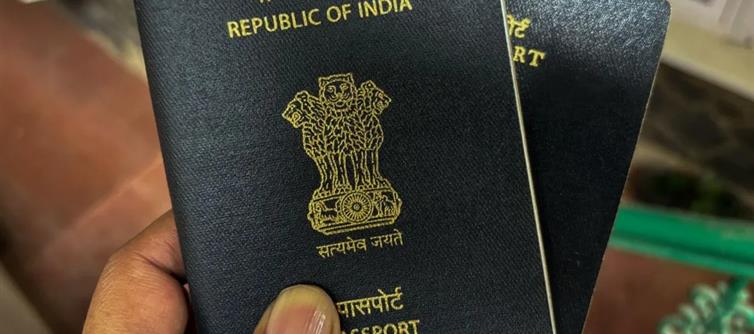
The world’s fifth-largest economy can’t fly freely.
A frustrated travel influencer’s viral rant about the “weak indian passport” was not just social media noise — it was a mirror to a deeper truth. Despite its growing GDP, tech power, and diplomatic swagger, India’s passport has once again fallen in global rankings. In the latest Henley Passport Index 2025, india stands 85th out of 199 countries, behind nations with economies one-tenth its size.
How did a country that sends satellites to Mars and CEOs to Silicon Valley end up stuck at airport visa counters? The answer lies in a mix of diplomatic stagnation, migration fears, security lapses, and the failure to build trust in global mobility.
📉 THE DECLINE: A FALL BEHIND THE CURVE
Ten years ago, india ranked 76th on the Henley Passport Index. Today, despite a booming economy and rising global profile, it’s still hovering in the 80s — and now, slipping to 85th again.
In contrast, Singapore tops the list with visa-free travel to 193 countries, followed by South Korea (190) and Japan (189). Indians? Just 57 countries — the same as Mauritania, a small West African nation most indians couldn’t locate on a map.
The decline isn’t because india lost allies — it’s because others are gaining them faster. Global travel partnerships are expanding, and india simply isn’t keeping pace.
🌍 GLOBAL MOBILITY: THE NEW DIPLOMATIC CURRENCY
In today’s world, passport strength isn’t just about tourism. It’s a symbol of soft power, stability, and trust. Strong passports mean citizens can travel, trade, study, and collaborate easily — a reflection of how the world views a nation’s reliability.
Henley & Partners note that the average global citizen can now travel to 109 countries visa-free, up from 58 in 2006. China, for instance, has jumped from 50 visa-free destinations in 2014 to 82 in 2025, lifting its rank from 94th to 60th.
india, meanwhile, gained access to just a handful more destinations — but lost momentum where it mattered: building reciprocal trust.
🧳 THE PASSPORT PARADOX
Here’s the irony: the number of visa-free countries for indians has increased since 2015, from 52 to 57. Yet, the rank is exactly the same: 85.
Why? Because the world has outpaced India. When every other country is signing visa-waiver deals, reciprocal agreements, and e-travel corridors, India’s foreign mobility remains bogged down in paperwork and slow diplomacy.
Worse, many developed nations still associate indian travelers with overstays and migration risk, leading to stricter scrutiny.
⚠️ IMAGE PROBLEM: MIGRATION, FRAUD & POLITICS
According to former indian Ambassador Achal Malhotra, “many countries are becoming increasingly wary of immigrants — and India’s reputation for visa overstays and fraudulent documentation doesn’t help.”
In 2024 alone, delhi Police arrested 203 people for passport and visa fraud. Add to that, cumbersome immigration systems and sluggish processing times, and you have a recipe for global distrust.
India’s image as a chaotic bureaucracy and a migration-heavy population often overshadows its achievements in technology, economy, and diplomacy.
🏛️ politics, STABILITY & TRUST DEFICIT
Global trust isn’t just built on economics; it’s shaped by stability. In the 1970s, indians enjoyed visa-free travel to parts of europe and the West. But the Khalistan movement and subsequent domestic upheavals changed that perception.
Today, India’s increasing political polarisation, censorship debates, and social unrest don’t inspire confidence among global partners. The U.S., too, has dropped to 12th place on the index for similar reasons — internal politics shaping external trust.
💳 technology CAN HELP, BUT DIPLOMACY DECIDES
India’s introduction of the electronic passport (e-passport) in 2024 was a step forward — embedding biometric chips and making forgery harder. But tech alone can’t fix perception.
Real mobility comes through bilateral agreements and proactive diplomacy. Without aggressive outreach and reciprocal trust deals, India’s global travelers will continue to face long queues, rejected visas, and endless paperwork.
🧠 WHAT india NEEDS TO DO
Negotiate more travel corridors — with Africa, Latin America, and Southeast Asia.
Crack down harder on visa fraud and overstays.
Modernise immigration processing with AI-driven efficiency.
Use soft power — Bollywood, yoga diplomacy, student exchange — to improve trust.
Separate politics from diplomacy — global image matters more than domestic narratives.
💥 BOTTOM LINE:
India’s economy is flying business class, but its passport is stuck in economy.
Until the country matches its global ambitions with diplomatic strategy and internal reform, the “rising superpower” will remain grounded at the visa counter — watching smaller nations fly past.




 click and follow Indiaherald WhatsApp channel
click and follow Indiaherald WhatsApp channel